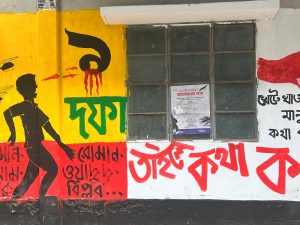The student-led uprising of July-August not only resulted in the ouster of Prime Minister Sheikh Hasina from power in Bangladesh, but also it has disrupted the country’s two-party political system.
Following her exit from Bangladesh, many Awami League (AL) members were jailed or went into hiding. The party is in a shambles and its future looks bleak.
The AL dominated Bangladesh politics till August 1975, when President Sheikh Mujibur Rahman was assassinated. For around 15 years thereafter, the country witnessed multiple coups and was governed by civilian- and military-led autocracies.
Since the restoration of parliamentary democracy in 1991, power has alternated between the two main parties, the AL and the Bangladesh Nationalist Party (BNP), led by Hasina and Khaleda Zia, respectively. Bitter rivalry has marked their relationship for decades.
Rather than challenge the AL and the BNP, Bangladesh’s smaller parties, which range from Islamist groups to left-leaning organizations, have usually backed either of the two main rivals. Thus, parties like the Jamaat-e-Islami, Jatiya Party, Islami Oikkyo Jot, Jatiyo Samajtantrik Dal (Jasad), and Communist Party of Bangladesh (CPB) formed pre-poll alliances with the BNP or AL, or acted as kingmakers in post-election arrangements.
This system created a stable political structure. However, it was stagnant as new political ideas and movements struggled to gain traction.
That appears to be changing post-Hasina.
The AL is in decline. It is being strongly criticized and even hated for its violation of human rights, including extrajudicial killings, enforced disappearances, corruption, and engineering of elections over the past 15 years when it was in power. However, the party has its hardcore supporters, and will be hoping that its promise of political stability and the opportunity of political rehabilitation will help in its revival in the next election.
The BNP on the other hand is thriving and most likely to win an overwhelming majority in the next general elections. However, there are allegations that some BNP grassroots-level leaders are engaged in extortion. This is adversely impacting its image. BNP leaders are acting against hundreds of members who are tarnishing the party’s image.
The recent student-led uprising has upended the two-party equilibrium by not only weakening the AL but also opening up space for a third force in Bangladeshi politics. A new party of students who led the July-August uprising is set to be formed in February 2025.
The emergence of a third force in the electoral arena presents Bangladesh with a unique opportunity to make its democracy more robust. By breaking the two-party stranglehold, the new party could introduce greater competition and accountability into the political system. It could inspire other grassroots movements and organizations to enter electoral politics, encouraging a more participatory form of democracy in Bangladesh.
The smaller parties, which have traditionally allied with the BNP or AL, could gravitate toward the new party, further weakening the dominance of the two major parties. This would result in a realignment of political alliances and a more fragmented but dynamic political landscape.
While both the BNP and AL appointed loyalists to the bureaucracy, police, and intelligence agencies, the politicization of state institutions was unprecedented during AL rule. Many high-ranking police officers and bureaucrats spoke like AL party members. The political disruption by the student uprising and the emergence of a new student-led party could change this, as the latter is expected to be more vigilant.
Politics in Bangladesh is not just about what happens inside Parliament. Those who dominate public discussion in civic spaces also matter. In this regard, the students-led Nagorik Committee, an ally of the students, is already doing well with new, upcoming, and younger faces from the committee discussing politics and governance in public forums, television talk shows, and newspapers. They are attracting urban youth.
The student-led uprising and the party emerging from it have the potential to transform Bangladeshi politics by challenging entrenched power structures, introducing greater democratic competition, and fostering a more participatory political culture.
However, it faces challenges. The new party will have to navigate a hostile political environment where the ruling elite often monopolizes state institutions, media, and resources. There is also the risk of fragmentation within the student movement, as differing ideologies and priorities come to the fore.

































